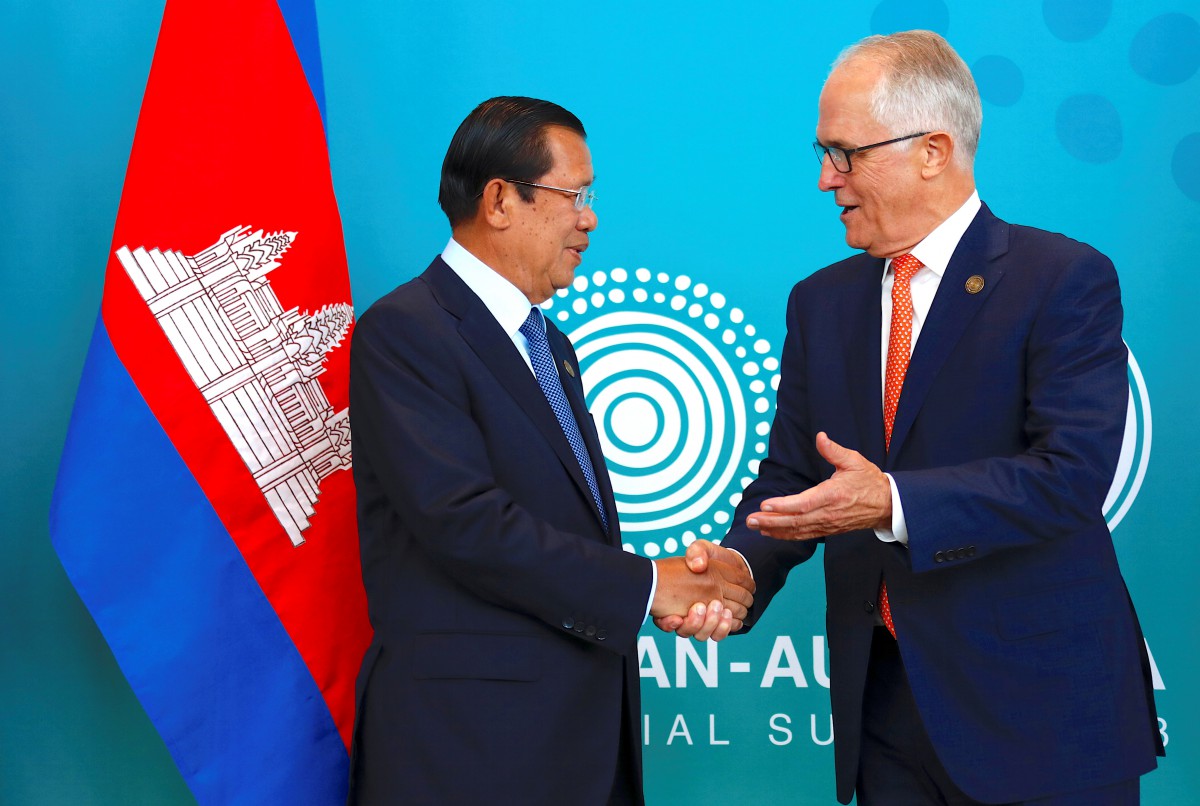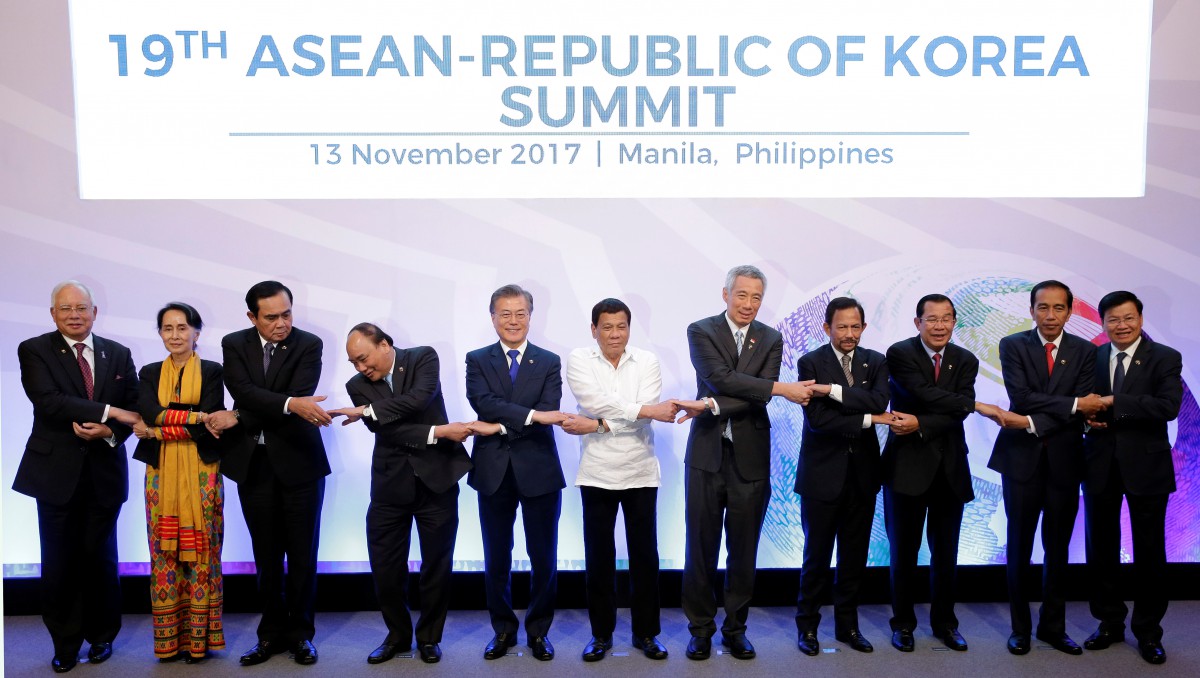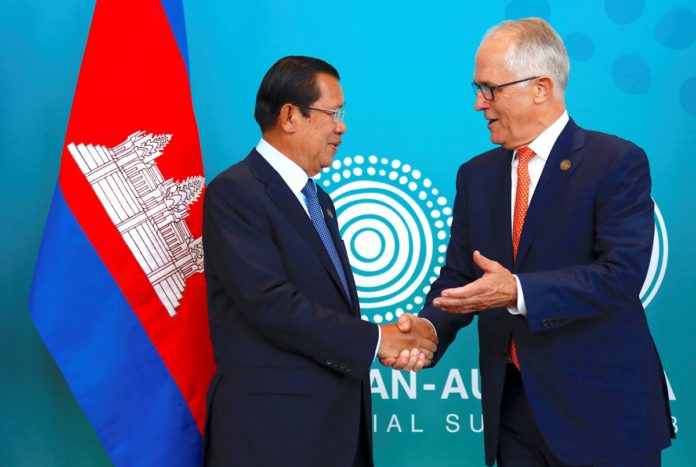AUSTRALIA’S promise to raise human rights concerns with Burma (Myanmar) and Cambodian leaders when they attend the summit of the Association of Southeast Asian Nations (Asean) in Sydney this weekend doesn’t go far enough, according to Human Rights Watch.
Australian Foreign Minister Julie Bishop said Friday that human rights abuses and the ongoing violence against the Rohingya minority in Burma would be “matters that we would be discussing with the Myanmar delegation” when the three-day summit begins on Friday.
SEE ALSO: Aung San Suu Kyi will come to the Asean summit with her reputation tarnished

Australian Prime Minister Malcolm Turnbull shakes hands with Cambodia’s Prime Minister Hun Sen before their bilateral meeting during the one-off summit of 10-member Association of Southeast Asian Nations (ASEAN) in Sydney, Australia, March 16, 2018. Source:/David Gray
But Director of Human Rights Watch Elaine Pearson doesn’t think this goes far enough.
“Ultimately, I don’t think, given the gravity of these abuses, that just having a quiet chat behind closed doors is really enough,” Pearson told Asian Correspondent, instead favouring a public statement by the government.
“It’s important, not just to get the message across to leaders but also so the people back home in Cambodia and Myanmar are crystal clear on what Australia’s position is … (The government) needs to send a message to the people that Australia is really concerned about the human rights abuses in those countries.”
SEE ALSO: Asean-Australia Special Summit marks step toward a deeper relationship
The three-day meet is officially aimed at strengthening political ties, counter-terrorism, and fostering economic cooperation between the 10-member Asean and Australia amid China’s rising influence.
The inclusion of Burma’s de facto leader Aung San Suu Kyi and Cambodia Prime Minister Hun Sen in the meeting has drawn criticism, and large protests are planned against both.
Hun Sen, a former Khmer Rouge general who has ruled Cambodia for more than 30 years, promised to personally attack any demonstrators should they burn effigies or pictures of him, saying: “I will follow you all the way to your doorstep and beat you right there … I can use violence against you.”
Asked about the threat, Bishop said Australia was “certainly going to raise our concerns with the Cambodian delegation.”
There will also be protests held condemning Suu Kyi for her lack of action in the continued persecution of Rohingya Muslims, which has seen almost 700,000 flee across the border into neighbouring Bangladesh.

(L-R) Malaysia’s Prime Minister Najib Razak, Myanmar’s State Counsellor Aung San Suu Kyi, Thailand’s Prime Minister Prayuth Chan-ocha, Vietnam’s Prime Minister Nguyen Xuan Phuc, South Korea President Moon Jae-in, Philippines’ President Rodrigo Duterte, Singapore’s Prime Minister Lee Hsien Loong, Brunei’s Sultan Hassanal Bolkiah, Cambodia’s Prime Minister Hun Sen, Indonesia’s President Joko Widodo and Laos’ Prime Minister Thongloun Sisoulith join hands during a family photo before the 19th ASEAN Republic of Korea Summit in Manila, Philippines November 13, 2017. Source: Reuters/Aaron Favila/Pool
Australian Prime Minister Malcolm Turnbull has been under pressure to condemn the Nobel laureate’s failure to speak out against the crisis.
“It is in our interest to engage all Asean members including Aung San Suu Kyi at this summit because it gives us the best chance of influencing outcomes and making our concerns known,” Bishop said.
Pearson urged the government to be direct in their petitions to the leaders by making it known that Australia will not consider the upcoming Cambodian election legitimate if it remains essentially a one-party state. She also called on Turnbull to demand that Burma allow access to the country by a UN fact-finding mission.
Australia risks missing a rare opportunity to engage on such a senior level with these countries, and the promise of improved trade should not take precedence over human rights issues, Pearson said. Without a clear and unambiguous message, the invite to the summit and the welcome from the Australian Prime Minister “will only give more legitimacy to these leaders,” she said.
{“total”:0,”error”:””,”stumbleupon”:0,”linkedin”:0,”facebook_total”:0,”google”:0,”pinterest”:0,”buffer”:0,”twitter”:0,”vk”:0}





